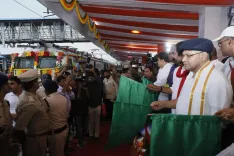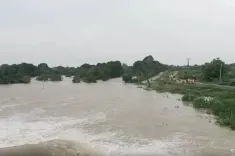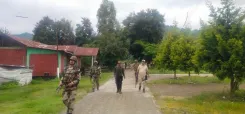Is Human Trafficking Still Outpacing Enforcement in Rajasthan?

Synopsis
Key Takeaways
- Human trafficking is a growing crisis in Rajasthan.
- Improved investigations are essential for prosecuting traffickers.
- Coordination among police, NGOs, and government is crucial.
- Technology use by traffickers necessitates advanced countermeasures.
- Awareness and education are key in combating trafficking.
Jaipur, July 19 (NationPress) The Director General of Police (DGP) of Rajasthan, Rajeev Sharma, expressed concerns on Saturday that the magnitude of the human trafficking crisis is continually exceeding the enforcement response.
“Trafficking is a global and national emergency, but our reaction remains inadequate,” stated the DGP during a brainstorming session focused on this issue, organized by the Anti-Human Trafficking Unit (AHTU) of Rajasthan Police.
He highlighted the alarming trend of children re-entering trafficking networks post-rescue, pointing out the lack of effective coordination among police, government entities, and NGOs.
Sharma emphasized the necessity of thorough investigations to uncover the masterminds behind trafficking operations. “Are we targeting the true criminals, or merely those caught at the scene?” he questioned, urging officers to construct strong cases for successful prosecutions.
The conference assembled senior police personnel, field agents, and various stakeholders to devise a more unified and effective strategy against all forms of human trafficking, including bonded labor, sex trafficking, and cross-border exploitation.
Malini Agarwal, Director General, Human Rights and AHTU, underscored the importance of grasping the evolving trends in trafficking, bolstering investigative skills, victim rescue and rehabilitation, along with stringent legal actions against offenders.
She referenced a 2024 ILO report highlighting the socio-economic factors fueling trafficking, revealing that global profits from this crime reached $236 billion annually—an astounding 37 percent increase since 2014.
Sanjay Agarwal, Director General of Intelligence, called for attention to the often-ignored rural sources of trafficking, particularly areas where children are seen begging or selling goods.
He pointed out the increasing use of technology by traffickers and urged law enforcement to employ advanced digital tools and cyber intelligence in their efforts.
During the conference, a resource booklet titled ‘Vimukt’ was launched, detailing best practices and case studies on anti-trafficking initiatives. Additionally, a multilingual awareness poster was introduced for display in police stations and public institutions to educate both frontline officers and local communities.
Sessions addressed various topics, from traditional bonded labor in rural Rajasthan to contemporary digital threats like AI-enabled commercial sexual exploitation of children (CSEC) through social media platforms.
According to NCRB data (2022), Rajasthan reported 117 cases of human trafficking that year, with 432 out of 461 rescued victims subjected to forced labor, making it the most common form.
Experts noted that Rajasthan's geographical situation renders it both a source and transit hub for trafficking networks, often deceiving vulnerable populations with false job offers and marriage promises.






